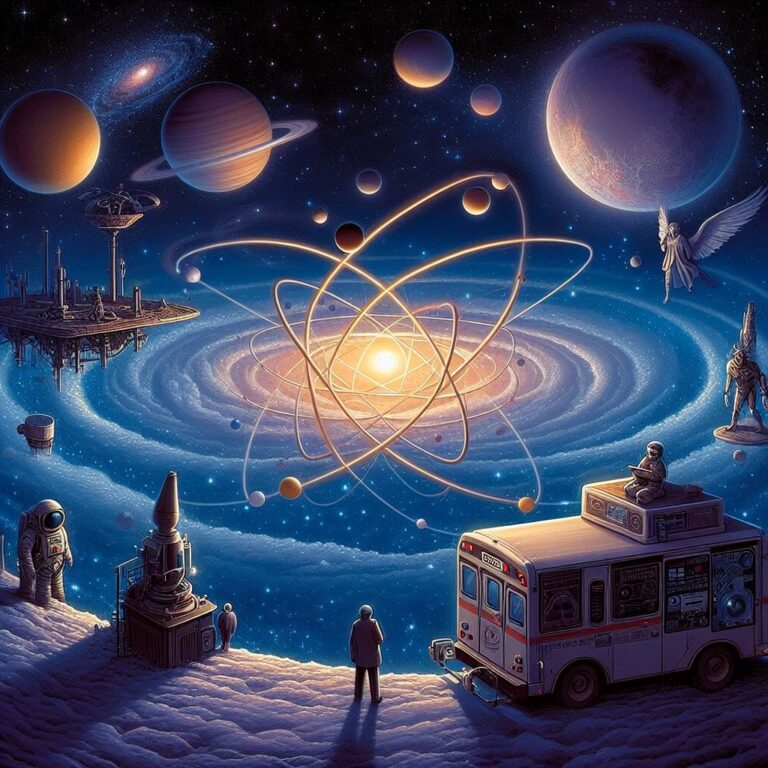Imagine our galaxy as a bustling metropolis, a dazzling tapestry of billions of stars, each potentially harboring planets capable of fostering life. Now, picture gazing across this vast cityscape, the twinkling lights representing countless worlds, yet encountering no signs of other inhabitants. This profound conundrum, known as the Fermi Paradox, has captivated and perplexed scientists and philosophers for decades, posing a fundamental question: where is everybody?
The Paradox Unfolds: Numbers Suggesting a Crowded Cosmos
Enrico Fermi, a renowned physicist, first articulated the paradox during a casual discussion in 1950. With billions of stars in our galaxy alone, many estimated to be billions of years old – ample time for intelligent life to evolve – the sheer vastness of space seems to favor the existence of extraterrestrial civilizations. Consider Earth, a tiny speck in this cosmic tapestry, nurturing intelligent life within only 4.5 billion years. If life arose here, the sheer probability suggests it should have emerged elsewhere too.
Furthermore, advancements in astronomy reveal Earth-like planets are surprisingly common. NASA’s Kepler space telescope alone identified thousands of exoplanets orbiting distant stars, with hundreds residing within the “Goldilocks zone,” a region deemed suitable for liquid water and potentially life as we know it. So, with vast real estate and seemingly favorable conditions, why haven’t we encountered any evidence of alien civilizations?
The Great Filter: Sifting Through Possibilities
Several hypotheses attempt to explain the “Great Silence,” suggesting potential roadblocks that might hinder the development or expansion of advanced civilizations. One possibility is the existence of a Great Filter, a critical hurdle that most civilizations fail to overcome. This filter could be a physical bottleneck, like a catastrophic asteroid impact, or a biological one, such as a self-destructive war or pandemic. If the filter acts early in a civilization’s development, it might explain why we haven’t encountered anyone, as most succumb before reaching interstellar communication capabilities.
Another intriguing avenue explores the limitations of our search methods. Perhaps extraterrestrial civilizations exist, but their communication methods are so alien or faint that we simply haven’t detected them. Imagine finding a message written in an unknown language; decoding it might prove impossible without a Rosetta Stone-like key. Similarly, advanced civilizations might utilize communication channels beyond our current detection capabilities, rendering them invisible to our searches.
Beyond Numbers: The Fermi Paradox and the Human Experience
Beyond the scientific implications, the Fermi Paradox sparks profound philosophical questions. Are we truly alone in the universe? Does our existence hold a unique significance, or are we simply one grain of sand on a vast cosmic beach? These questions challenge our anthropocentric view, forcing us to reconsider our place in the grand scheme of things.
Furthermore, the possibility of advanced civilizations encountering the Great Filter themselves raises unsettling questions. Did they overcome it, perhaps achieving a utopian state or transcending physical limitations? Or did they succumb, serving as a cautionary tale for our own civilization? Exploring these possibilities, however unsettling, can guide our own development and decision-making as we venture into the cosmos.
The Fermi Paradox: Fueling the Quest for Answers
The search for answers to the Fermi Paradox remains an active and multifaceted endeavor. From exploring the vast cosmic canvas with next-generation telescopes like the James Webb Space Telescope to searching for biosignatures in exoplanet atmospheres, scientists are continually expanding the search for extraterrestrial intelligence (SETI).
Beyond searching for signals, we’re also pushing the boundaries of theoretical understanding. Astrobiologists investigate how life might arise and evolve in extreme environments, while philosophers and social scientists consider the potential impact of discovering intelligent life on our understanding of ourselves and the universe.
Perhaps one day, a faint signal, a cryptic message, or a technological artefact will provide the long-awaited answer to the Great Silence, forever altering our understanding of our place in the universe. However, even without immediate answers, the Fermi Paradox serves as a powerful catalyst, driving scientific inquiry, philosophical thought, and our collective search for understanding our place in the vastness of existence.
Looking Ahead: Embracing the Unknown
The Fermi Paradox might not offer definitive answers today, but it fuels our desire to explore, understand, and ultimately connect with the unknown. As we venture deeper into the cosmos, equipped with ever-more sophisticated tools and insatiable curiosity, the answers we seek may lie just beyond our current horizon. The Great Silence might hold countless stories waiting to be unraveled, narratives of civilizations long gone, lessons learned, and possibilities yet to be imagined. Perhaps, as we continue our journey of discovery, the true significance of the Fermi Paradox lies not in the answers it provides, but in the questions it inspires and the relentless pursuit of understanding that it drives.
Check out more articles like this at Science Archives – Topic In One Article
